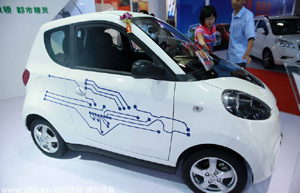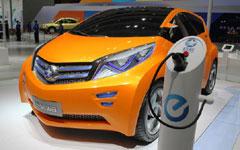China will launch more fiscal support policies for the new-energy vehicle industry from 2016 to 2020, according to a notice the State Council (cabinet) released on Monday.
The notice said details about the new program will be formulated and released before the end of the year as the current subsidy program is set to expire by the end of 2015.
New-energy vehicles include pure electric ones, plug-in hybrids and fuel cell vehicles.
However, imported models will not benefit from the program and steps like the waiver of purchase tax will help domestic green automobile development and manufacturing, said Su Bo, vice-minister of the Industry and Information Technology Ministry. The purchase tax exemption is valid from Sept 1 to the end of 2017.
 |
|
 |
"Fewer high-end car imports will help the nation's car industry both in terms of sales and innovation," he said.
Su also acknowledged the "achievements" made by the domestic-overseas joint ventures, calling them "backbone" of innovation in China.
Excluding overseas-made cars is also because of a shortage of government funds, he said.
Statistics from the China Association of Automobile Manufacturers show that China produced 20,692 new-energy vehicles and sold 20,477 ones during the first six months of the year, more than double the number from the same period last year.
The State Council notice also said that the central government will compile a uniform list of models eligible for subsidies to break local protectionism.
Local governments used to come up with such lists earlier as they usually offer a subsidy similar to the one provided by the central government.
It is "definitely good news" and will help boost the development of new-energy vehicles in the country as protectionism used to be serious in local governments' lists, said Yale Zhang, managing director of Shanghai-based consulting firm Automotive Foresight.
"Local governments offer such incentives to ensure that the funds do not flow to automakers outside their jurisdiction," he said.
John Zeng, an analyst at Shanghai-based consulting firm LMC Automotive, termed the move "a key step" among the wave of favorable policies but added that it will take time to see whether it dampens the enthusiasm of local governments "now that they have no say in compiling the list but still offer the money".
Zeng also urged Chinese automakers to utilize the chance to come up with competitive models.
"It is clear that the government wants to cultivate the new-energy vehicle market as soon as possible but it is difficult to say who will be the dominant players by then."
